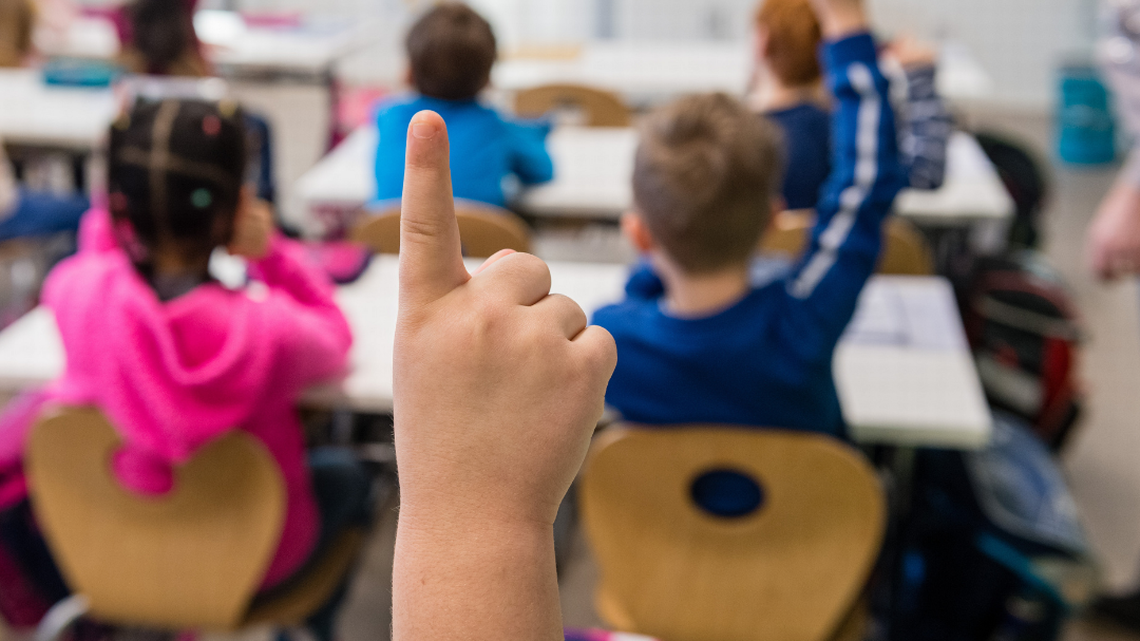
The child poverty rate in the U.S. more than doubled last year because child tax credits were allowed to expire. JENS SCHLUETER/AFP via Getty Images
We’ve spent a lot of time this week talking about Hunter Biden and impeachment, which is fair enough. I just wish we’d found more time to discuss another story, because it painted an alarming picture of what’s happening to millions of low-income Americans ― and made it very clear which party’s leaders want to do something about it.
I’m talking about the annual U.S. Census Bureau report on income and health insurance, which came out Tuesday and which my colleague Jonathan Nicholson summarized for HuffPost. The report found that the country’s poverty rate jumped from 7.8% in 2021 to 12.4% last year ― and that the poverty rate among children, specifically, rose even more dramatically, from 5.2% to 12.4%.
To put it another way, last year more than 1 in 8 American kids were living in a household struggling to pay for food, shelter, transportation and other essentials. Just a year before, fewer than half as many kids were in that position.
Of course, none of this was a surprise. In 2020 and 2021, poverty fell dramatically, with poverty among children hitting record lows. The reason was the extra income support that the federal government had provided as part of its efforts to get families ― and the U.S. economy ― through the disruptions of the COVID-19 pandemic.
A key element of that support was the child tax credit that provided families with up to $300 a month per child from July through December 2021. The credit was part of the American Rescue Plan, which President Joe Biden and congressional Democrats enacted shortly after he took office. Biden and his allies had hoped to make the temporary measure permanent. But they couldn’t get the votes. Republicans wouldn’t support it, which left the proposal’s fate in the hands of the Senate’s most conservative Democrat, Joe Manchin of West Virginia. Manchin blanched at the credit’s impact on the federal budget, and expressed concern that low-income families would use the money to buy drugs. In reality, as the data showed, low-income Americans were using the money mainly to pay for necessities. Now, with the assistance gone, they are back to paying more for those necessities ― or not getting them at all. Which is to say, they’re back in poverty. It’s a disheartening, devastating story. And it’s not the last time we’re going to hear a version of it. As usual, the annual Census report also included statistics on health insurance coverage. In 2022, just 8.3% of Americans had no insurance. That’s the lowest share ever recorded, which is great. But a big reason for that was another pandemic relief measure ― a federally imposed suspension of states’ requirements that Medicaid recipients reconfirm their eligibility for the program. That suspension ended earlier this year, which means states have started up the eligibility verification process again. “What we’ve proved is that poverty for children in America is not some accident. It’s a policy choice.” So far, nearly 6.5 million Medicaid recipients have lost coverage through this process, according to a running tally the health research organization KFF is keeping. A large number of these people are losing coverage for “procedural” reasons, meaning they might still be eligible for Medicaid and are only losing coverage because they got stuck or lost in the bureaucratic process of showing they still qualify. As a result, next year’s figures are likely to show an increase ― quite possibly a substantial one ― in the number of uninsured Americans. And based on the data about exactly who is losing Medicaid for procedural reasons, experts like Georgetown University research Professor Joan Alker are predicting that increase could include several million children. So not only would something like 1 in 8 kids be living in poverty, but a great many of them wouldn’t have health insurance, either. Proponents of aggressive cuts argue that Medicaid rolls currently include lots of people who have found alternative sources of insurance. That’s true. But it’s also true that many states make demonstrating Medicaid eligibility difficult, in order to minimize enrollment, and have been doing so for a long time. It’s among the reasons so many Americans have remained uninsured even with programs like the Affordable Care Act in place. In a sense, the pandemic-era suspension of Medicaid disenrollments functioned a lot like the temporary tax credit for children: It strengthened the safety net, so that Americans were getting the kind of support their Western European counterparts have received from their governments for a long time. And while maintaining those pandemic measures required more government spending ― which is what so bothered Manchin and the Republicans ― it also achieved what it was supposed to achieve. Fewer families had to go hungry or without housing. More of them got health care. Kids especially stood to benefit, given all the data that links reliable food, shelter and health insurance to future emotional, intellectual and physical well-being. That impact doesn’t seem to have registered with most Republicans, who have been pushing for tax cuts that would make it even harder to fund income support programs ― and who, preoccupied with their impeachment inquiry into Biden, had little to say about the poverty numbers this week. Their Democratic counterparts certainly noticed ― although, absent the votes to do something about it, all they could do was point out the irony. “We have now proved something pretty phenomenal and at the same time, pretty obscene,” Sen. Cory Booker (D-N.J.) said this week. “What we’ve proved is that poverty for children in America is not some accident. It’s a policy choice.”

Coming Next: More Uninsured Americans
A Glimpse Of What Might Have Been
